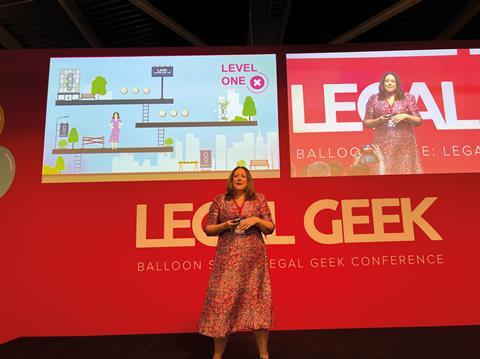Artificial intelligence continues to dominate lawtech, but will the challenges of regulation slow the pace of innovation?
In September I travelled to São Paulo with Legal Utopia’s mission, supported by Innovate UK Business Connect Global Explorer’s fund, to explore the possibility of market expansion in Brazil. Brazil has more than 1.3 million lawyers and a large population which is used to accessing services online. Most of the industry stakeholders we met, including lawyers, investors, industry associations and consumer focus groups, were positive about a new platform for law firm business development and interested in getting involved. However, there was a clear message that it was advisable to open up a dialogue with the Ordem dos Advogados do Brasil (OAB), the single legal regulator (at state and federal level), and its ethics committee, which decides whether an activity is permissible under OAB rules. This is notwithstanding that Legal Utopia is an intermediary rather than a legal services provider and is not proposing to offer legal services.

This is not an insurmountable barrier, but it demonstrates that launching a start-up into any highly regulated market means staying on the right side of its regulators – even if your business is outside its remit. Clearly, there is a need to regulate legal services, based on the importance of consumer protection, and to enable online platforms to promote regulated providers that meet professional standards directly to consumers. But the need for this interaction highlights that the uneasy interface between regulation and innovation can be a barrier to lawtech innovation everywhere.
It is unsurprising that the regulator’s validation is an important factor in establishing a market presence – and trust – for Brazil’s nascent lawtech sector. However, regulation is also a barrier to innovation in the UK, despite our liberalised legal market and a mature, well-funded lawtech sector that is supported by government initiatives and resources.
AI will test regulation
'Even if it is illegal for machines to decide certain questions, the humans, who are legally accountable, may be left with no economic choice but to accept the AI’s work product'
Sir Geoffrey Vos, master of the rolls
Last week at Legal Geek, whose organisers partner with Codebase in Edinburgh to deliver LawtechUK, the Ministry of Justice-backed initiative to drive digital transformation in the legal sector, the master of the rolls Sir Geoffrey Vos addressed the dichotomy of regulation versus innovation. He said that developments in artificial intelligence would put regulation to the test, because ultimately ‘citizens will use… AI tools… to get legal advice’. He continued: ‘Even if it is illegal (as, for example, under the AI Act) for machines to decide certain questions, the humans, who are legally accountable, may be left with no economic choice but to accept the AI’s work product. This creates legal, regulatory and ethical conundrums for the future.’
Finally he quoted Mario Draghi’s report on the future of European competitiveness: ‘The EU’s regulatory stance towards tech companies hampers innovation.’ He then addressed the audience (about 30% of whom were lawyers), saying: ‘You lawyers will need to make sure that regulation supports rather than hampers innovation.’
Steps are indeed being taken in the right direction – by the legislators, not the litigators. The government has acknowledged that regulation is a barrier to innovation and growth. On 8 October, the science and technology secretary Peter Kyle launched the Regulatory Innovation Office – RIO – to speed up the approval of new technologies, ensure different regulatory bodies work together smoothly to boost economic growth and keep the UK at the forefront of global innovation.
In 2021, LawtechUK recognised the need to involve regulators when it established its Regulatory Response Unit. This gives start-ups on its various programmes fast-track access to 12 regulators, and its Regulatory Navigation Tool – a quick reference guide that helps those innovating in law navigate the regulatory landscape and quickly see which activities require regulatory approval or exemption. This is a necessary and valuable facility for lawtech start-ups developing consumer applications and/or utilising publicly available data, who may need to consult multiple regulators.
Game theory
At Legal Geek, Addleshaw Goddard used gamification to explain prompt engineering. Innovation group head Kerry Westland’s (pictured) presentation on ‘Levelling up your prompting game’ was amplified by a popular game on the firm’s stand and a workshop. This reinforces the point that the only way to leverage GenAI tools is to play with them and see how they work for you.
Not only is Addleshaw Goddard deploying GenAI for multiple use cases, but it regularly shares insights gained from its long-term build-and-buy strategy. It recently published a report about the use of large language models in legal due diligence for commercial transactions using retrieval augmented generation (RAG). Instead of using an off-the-shelf product, it configured its own system, using RAG and then the OpenAI LLM GPT-4-32K (accessed via Microsoft Azure OpenAI). And unusually for a law firm, its paper sets out a detailed methodology showing exactly how it achieved the accuracy improvements it was looking for.

Investors take lawtech seriously
Last week’s Lawtech UK investment event made it absolutely clear that mainstream investors are serious about funding legal tech/lawtech. After three short opening speeches, including one from Professor Richard Susskind, there were presentations from local and international venture funders who are keen to work with lawtech start-ups and scale-ups. London & Partners, a business growth agency for London, which supports start-ups and small businesses in London looking to expand here and abroad, recently helped Robin AI set up in New York. Anthony Rose, founder and CEO of SeedLegals, which supports one in three legaltech start-ups as well as tax and fintech companies, spoke about the ‘productisation’ of fundraising and how SeedLegals uses tech to manage contracts and deal terms, workflows and funding rounds. Robert Walsh, board director at Stride Ventures which lends money to businesses, explained in some detail the criteria for venture debt – which is cheaper and less restrictive than equity funding.
We then saw a lawtech start-up showcase, featuring Danae Shell, founder of Valla, Chris Green, founder of Xapien, and Dia Thanki, founder of Alchemy Machines, all of whom had participated in LawtechUK programmes. We were also scheduled to hear from Rafie Faruq, founder of Genie AI, which has just raised $17.8m in Series A funding, led by Google Ventures and joined by Khosla Ventures (an early investor in Open AI).
The meeting indicated that LawtechUK has achieved its stated objectives of increasing lawtech adoption and innovation, supporting the growth of the UK lawtech sector and expanding lawtech into the UK regions. This raises the question: what next for LawtechUK? It was answered the following day at Legal Geek by LawtechUK chair Christina Blacklaws. She outlined current start-up and scale-up programmes, and further initiatives focused on identifying how tech can support access to justice and address unmet legal need. This is a major task, given that, as Susskind said in his opening speech at the LawtechUK investment event, 90% of lawtech is designed for law firms, with the current focus being generative AI (GenAI), from automation to agents.
Legal Geek – in the GenAI bubble
Legal Geek’s agenda and exhibit hall demonstrated that the GenAI bubble is still huge in legaltech, to the extent that some attendees were reporting ‘AI fatigue’. This was alleviated by entertaining sessions about generative AI – including from Addleshaw Goddard and BRYTER.
Hot takes
Michael Grupp, founder and CEO of no-code service automation platform BRYTER, is a regular presenter at Legal Geek and his sessions are always creative and fun. This year, he hosted a panel featuring Nicola Shaver from Legaltech Hub and Richard Tromans from Artificial Lawyer, who had the choice of answering audience questions or eating hot chilli sauce. Questions included:
- Should in-house lawyers use AI instead of lawyers? Answer: yes, because AI will enable them to keep more work in-house; and no, because they still need specialist expertise.
- What are you tired of hearing about at legal tech conferences? Answer: The demise of the billable hour; the end of lawyers. It was telling that panellists chose to eat the chilli rather than discuss:
- Which vendors exhibiting at this year’s Legal Geek won’t be there next year?
Is AI democratising legal tech?
An interesting point that was covered in several sessions was AI’s ability to democratise legal tech beyond lawyers and legal departments. In corporations, contract review tools – we heard from Richard Mabey from Juro, Andy Wishart from Agiloft, and Daniel Lewis from Japanese AI contract review company LegalOn which recently launched in the UK – are enabling different business functions to manage contracts without relying on in-house lawyers. And smaller point solutions, such as Ben Darby’s AI start-up Ordli, are helping consumers manage the responsibility of having power of attorney over elderly and vulnerable relatives.
While Legal Geek is a brilliant networking opportunity, attracting a diverse, international selection of speakers, vendors and attendees, there was a feeling that it had shifted away from its original identity as the legal tech start-up event to a celebration of AI and automation.
Of course, Legal Geek was not all about promotion. There were the usual sessions on wellbeing and some AI myths were dispelled. While many firms are investing in GenAI, so far it is not replacing any roles or even any existing technology. There are plenty of use cases, but it is early days – it is less than two years since the launch of ChatGPT, so it is still a matter of waiting until the froth subsides to see the real difference it makes.































No comments yet